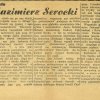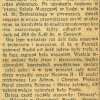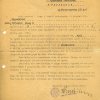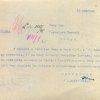1940–1949
1940
March
Kazmierz Serocki gets through to occupied Warsaw, where he stays at his uncle’s.
1941–44
Serocki enrols in a clandestine conservatory in Warsaw. He completes a three-year harmony course and a two-year counterpoint course, and continues his piano education with Zofia Buckiewicz. He meets Jan Krenz in Kazimierz Sikorski’s class.
While in Warsaw, Serocki earns his living in cafes, playing popular melodies and harmonising them in the spirit of jazz conventions of the 1930s. It is at that time that his creative ambition is awakened and he composes his first works, including Etude, Prelude and two Mazurkas for piano.
1945
After the end of the war Serocki continues his education at the Łódź Conservatory, studying piano with Stanisław Szpinalski and composition with Kazimierz Sikorski. He becomes friends with Zbigniew Szymonowicz, Bożena Matulewicz, Zofia Vogtman, Jan Krenz and Hanna Wąsalanka. He also meets his future wife, Zofia Adamowska.
At the same time Serocki takes on various jobs to earn a living. He works as, for instance, artistic manager of a variety orchestra at the Office of Information and Propaganda of the Pomeranian Province and head of the music publishing department at the Military Scientific and Publishing Institute. In addition, between 15 April and 15 October he works as the head of the music department at the State Theatre in Bydgoszcz. He also organises free concerts for military hospitals and community organisations.
The Polish Radio invites him to play his piano works composed during the occupation: Etude, Prelude and 2 Mazurkas.
7 September
Serocki joins ZAIKS (Association of Stage Authors and Composers), with “light music” being his main section and “classical music” his secondary section.
1946
Serocki graduates in piano and composition. His graduation work is Concertino for piano and orchestra, which is recorded and broadcast by the Polish Radio. He becomes known as a very promising pianist and composer.
16 June
Ziemia Pomorska writes about Serocki’s piano debut at the Pomeranian House of Art in Bydgoszcz, which was enthusiastically received by the audience. According to a reviewer:
A particular predilection for contemporary music allowed the debuting artist to give a magnificent performance of Szymanowski’s Fantasia, Debussy’s La soirée dans Grenade and Ravel’s Sérénade grotesque.
24 June
The Military Publishing Institute issues Serocki with a certificate of employment to be submitted to the Housing Department of the City of Bydgoszcz. This is to enable the composer to keep his Bydgoszcz flat.
In August the composer settles permanently in Warsaw.
1946–47
The Municipal Drama Theatres in Warsaw engage Serocki for a period from 1 August 1946 to 21 August 1947 to work as a musical illustrator and pianist.
1947
25 August
The Polish Composers’ Union receives Serocki’s membership application. Positive opinions come from artists like Piotr Rytel, Witold Lutosławski, Bolesław Woytowicz and Kazimierz Wiłkomirski, though their suggestion is to accept Serocki as a “candidate member”.
Recommended by the then head of the Department of Music at the Ministry of Culture and Art, Witold Rudziński, Serocki receives a scholarship from the French government for the most talented young composers and begins preparing for his departure for Paris.
22 November
The Ministry of Culture and Art allots Kazimierz Serocki, residing in Warsaw (ul. Marszałkowska 137/2), “one B class piano”, which he can look for in and bring from the Recovered Territories.
4 December
The composer marries Zofia Adamowska.
1948
January–July
Serocki is in Paris on a scholarship, studying with Nadia Boulanger (composition) and Lazare Levy (piano). He uses this stay also to become familiar with the most innovative phenomena in contemporary music: he is particularly interested in the twelve-note system promoted in France by Rene Leibowitz.
12 June
The Polish Composers’ Union accepts Kazimierz Serocki as a “candidate member”.
5 July
Serocki informs the Board of the Polish Composers’ Union of his return from the scholarship and his newly composed works: Symphonic scherzo, Triptych for chamber orchestra and a children’s suite for piano – Five Dwarfs.
15 September
Serocki asks the Polish Composers’ Union to be made a full (ordinary) member.
1949
Kazimierz Serocki’s Sonatina for piano wins a prize during a competition for composers organised to mark the centenary of Fryderyk Chopin’s death. He also writes Three Kurpian Melodiesfor instrumental ensemble.
5 April
Serocki gives a piano recital in Warsaw, presenting a programme featuring works by Bach, Beethoven, Chopin, Grechaninov, Debussy, Ravel and Szymanowski.
8–9 May
The Radio Festival of Folk Music features the premiere of Kazimierz Serocki’s Four Folk Dances.
May–June
The Admissions Committee of the Polish Composers’ Union decides to keep Serocki’s status as candidate member. Rytel, Maklakiewicz and Sikorski sign the following opinion:
Having carefully studied the material [comprising Concertinofor piano and orchestra, Symphonic Scherzo, film scores, 10 Variations with Fugue on an Original Theme and Five Dwarfs– I.L.] submitted by K. Serocki, the Committee does not see any significant changes in K. Serocki’s oeuvre that would justify his promotion to the highest level of membership in the Polish Composers’ Union [...]
The Polish Composers’ Union commissions Serocki to write an opera-ballet, Mary the Orphan and the Dwarfs.
5–8 August
Serocki takes part in the 4th National Congress of Composers and Music Critics in Łagów Lubuski. Together with Jan Krenz (b. 1926) and Tadeusz Baird (b. 1926) he forms “Group 49”. This is how Tadeusz Baird remembers this moment:
Kazimierz Serocki, Jan Krenz and I met in a marina on one of the Łagów lakes, and after some discussion we decided to stick together and, in fact, join our forces, talent and various skills to find our way in this difficult, complicated, alien and dangerous world.
When it comes to the friendship of the three young artists, Jan Krenz described it in the following manner:
This was a calm and stable friendship; it had no turbulent moments, such as those that happened in relations with my other friends [...] This friendship was based on a constant need to exchange thoughts about music and about life. We spent many hours together, many moments of true spiritual closeness.
29 December
The Polish Composers’ Union accepts Kazimierz Serocki as a full member.














